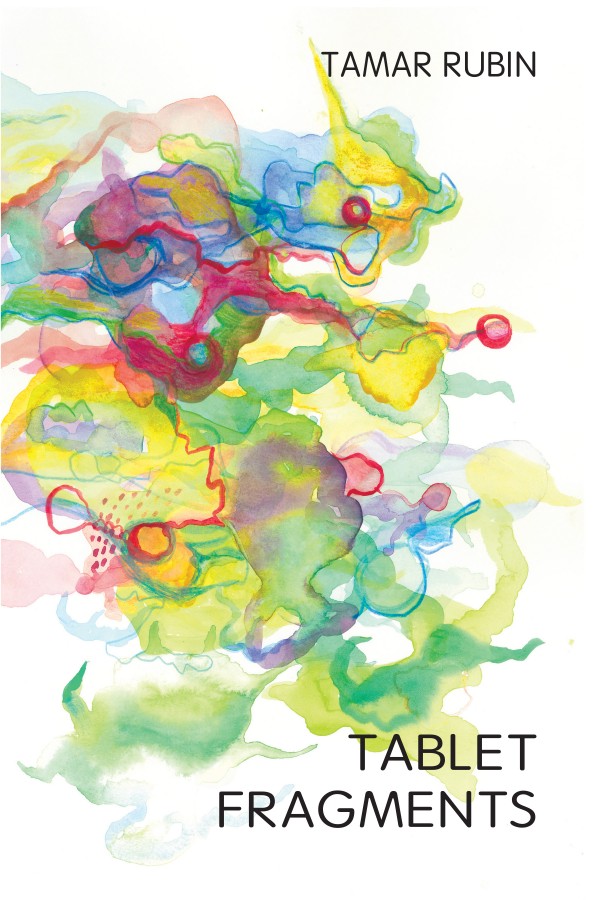Witty and wise, Tamar Rubin’s debut collection, Tablet Fragments, fuses elements of her life as a doctor, mother, daughter, and Jew whose lineage is as varied as her verse. Her lyrics are pared down toward minimalism that nevertheless radiates outward, as her lines and margins leave room for breathing and meaning. From the opening poem, “Home Archeology,” to her concluding “Wedding Ceremony for Body Parts,” synecdoche recurs as a major stylistic component of her medical career and domestic conflicts. Hebrew fonts and backgrounds add resonance to these parts and create a wholeness from the fragments of tables and tableaux.

“Home Archeology” presents items within the poet’s house, but hints at what is beneath and beyond mere surface to arrive at distinctions between house and home, between physical and spiritual existence. The first stanza begins with “words / for things we own: spatula, / womb chair, driveway.” Questioning ownership, synecdoche progresses from domestic interior to a womb chair that invokes motherhood and medical delivery, before moving to the exterior of Exodus and exile. (Similarly, the early poem, “Grey,’ with its silent tone, expands to the later “Eulogy for a Graveyard and Converted Church Along Grey Country Road #1,” where Grey’s “Elegy” and Gray’s Anatomy combine poetic and medical history.)
As a seat of genealogy, womb chair gives birth to “Plague of the First Born” and “Post-Partum To-do List.” Rubin exchanges spatula for stethoscope in her rhyming of “driveway” and “display.” Against the small talk, surface clutter, and words that may “say nothing,” deeper implications arise from internal relics of memory. “Home Archaeology” ends in silence filled with sound: “But my mouth is all cushions, / and carpets – words, and material clutter / strangle me.” The alliterated cushions may cover the womb chair or prepare for the silence at the beginning of the next poem, “Renovation Poem 570 A-3”: “Each word a pleasing chip of how our lives might go.” Words chipped and chiselled join terrestrial and celestial colours, and suture lines and lives.
“Wedding Ceremony for Body Parts” reaffirms the synecdoche of anatomy: “Goodnight cheeks. Goodnight neck. / Goodnight fingers, wrists, legs.” After the scalpel, the suture heals: “Bless the broken bits / that make me whole.” Rubin’s minimalism is most apparent in the terse couplets of “Speaking Crow,” where sibilance dominates a static relationship: “silent / as a syntax scrapyard.” Listening to the syntax scrapyard, the poet sees “the glint of little things” – her internal rhymes and rhythms combining into plenitude.
Hebrew fonts glint and decorate her bilingual text, much as she decorates domestic interiors. Scattered and shattered, those floating biblical signifiers travel across centuries and seas. Aleph, Moses, shame, and ragged edges initiate the sequence of “Tablet Fragments.” She arrives at “daled,” the doorway or threshold through which pass Jewish history and memory: “I kept the parts although they had no function for anyone, anymore.” Yet the poem concludes on the following page that reverses those words with “except for me, . . . so I could hold them” and six Hebrew letters laddered, descending from above.
The double alphabet and dual identities recur in “Tamar” where she dissects her own name from the Hebrew word for date fruit or palm tree. Her family tree and etymology are never far from biblical antecedents. In her mixed background she is accustomed to “recreating words backward” and pronouncing the Hebrew, “dates / cleaving tongue to roof of mouth.” Her cleaving is both scalpel and suture, doctor and daughter of “Calling Winnipeg Home.” From “Home Archeology to “Calling Winnipeg Home,” Rubin’s minimalist “I” names parts and pasts across a diaspora where the Mosaic Law is broken and repaired, shard by shard.
Bios
Michael Greenstein
Michael Greenstein has taught at the Université de Sherbrooke and the University of Toronto. He is the author of Third Solitudes: Tradition and Discontinuity in Jewish-Canadian Literature and the Poetry Editor of The Miramichi Reader. [updated in 2022]

